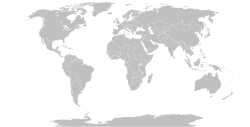Lebanon–Palestine relations
This article needs additional citations for verification. (June 2023) |
 | |
Lebanon |
Palestine |
|---|---|
The connection between Lebanon and Palestine as modern countries dates back to the beginning of the 20th century, during a time when they were both under the control of the Ottoman Empire. Both countries share a rich and interconnected history and culture.
Lebanon was placed under French rule as a mandate following the fall of the Ottoman Empire, whereas Palestine was put under the authority of the British government. During the founding of the State of Israel (frequently called the Nakba), numerous Palestinians who had been displaced sought safety in Lebanon,[1] resulting in strengthened relations between the two nations.
Political conflicts and tensions that have developed over time have complicated the relationship. Lebanon served as a support base for militant Palestinian groups that frequently clashed with Israel during the 1970s and 1980s.[2] Israel's military actions in southern Lebanon as a result led to a worsening of the nation's stability. In order to defeat and drive out the PLO, a full invasion was conducted in 1982.
At the start of 2016, the United Nations Relief and Works Agency (UNRWA) documented that there were more than 504,000 Palestinian refugees in Lebanon. It is thought that a number of these individuals have since left the country.[3] There are still a sizable number of Palestinian refugees living in Lebanon today, but their financial and legal situation is frequently precarious. The two countries continue to have a complex relationship that is influenced by the local political climate.
See also[edit]
- PLO in Lebanon
- Palestinians in Lebanon
- Palestinian insurgency in South Lebanon
- Israeli–Lebanese conflict
References[edit]
- ^ "Palestinian Groups Fight for Survival in Lebanon". The New York Times. 18 August 1976.
- ^ Brynen, Rex (1989). "PLO Policy in Lebanon: Legacies and Lessons". Journal of Palestine Studies. 18 (2): 48–70. doi:10.2307/2537633. JSTOR 2537633.
- ^ https://www.refworld.org/pdfid/56cc95484.pdf


